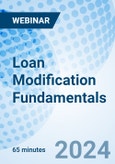Learn how to differentiate between loan modification and forbearance agreements to ensure the best option for your clients.
Borrowers may encounter a temporary hardship that may prevent them from remaining current on their mortgage loan and making payments on a timely basis. When contacted by a borrower for assistance, a forbearance agreement may be the solution to their problem. This live webinar will provide insight to the person negotiating or drafting forbearance agreements on behalf of creditors as to what provisions should be included in forbearance agreements. This presentation will critically look into avoiding loss of priority, the statute of limitations issues, and litigation, or should a borrower default after entering into the forbearance agreement.
Learning Objectives
- You will be able to define and distinguish between a Loan Modification and a Forbearance Agreement.
- You will be able to ascertain when a Forbearance Agreement should be entered into prior to a Loan Modification.
- You will be able to review Forbearance Agreements to ensure they provide essential clauses.
- You will be able to explain the procedure required to proceed with foreclosure after a default under a Forbearance Agreement.
Agenda
Distinguishing Forbearance Agreements From Loan Modifications
- Loan Modifications Are Permanent; Forbearance Agreements Are Temporary
- Forbearance Agreements as Trial Modifications
- When Are Subordination Agreements or Consent Agreements From Subordinate Lienholders or Guarantors Required?
- Clearing Title While a Forbearance Agreement or Trial Modification Is in Effect Prior to Entering Into a Loan Modification
Forbearance Agreements Can Be Entered Into Before Commencement or During a Foreclosure Action
Dual Tracking Prohibition Against Entering Judgment If the Borrower Is Complying With the Forbearance Agreement
Acknowledgments
- Ratification and Confirmation of Loan Docs
- Acknowledging the Total Amount of Debt Including Interest, Late Charges, and Legal Fees and Costs
- Acknowledging Debt and Expressing Intent to Pay
Providing Remedies for Subsequent Default
- Notice Requirements
- Acceleration/Deceleration and Proceeding With Foreclosure
Speakers

Nicholas Perciballi,
Roach & Lin, P.C.- Partner of Roach & Lin, P.C.
- Over 15 years of experience in Mortgage Default Servicing, in both small and large firm settings representing many of the largest lenders/servicers in the industry
- Practices in all areas of Mortgage Default Servicing, including foreclosure, loss mitigation, bankruptcy, litigation, evictions and REO sales throughout the entire State of New York
- embership information – New York City Bar Association (Member, Mortgage Foreclosure Task Force Committee- 2019 to present)
- J.D. degree, Thomas M. Cooley Law School
- B.B.A. degree, Finance, Hofstra University
Who Should Attend
This live webinar is designed for attorneys, branch managers, bankers, presidents and vice presidents, loan officers, mortgage brokers, loan department personnel, credit and collection managers, CFOs, branch managers, accountants and auditors.









